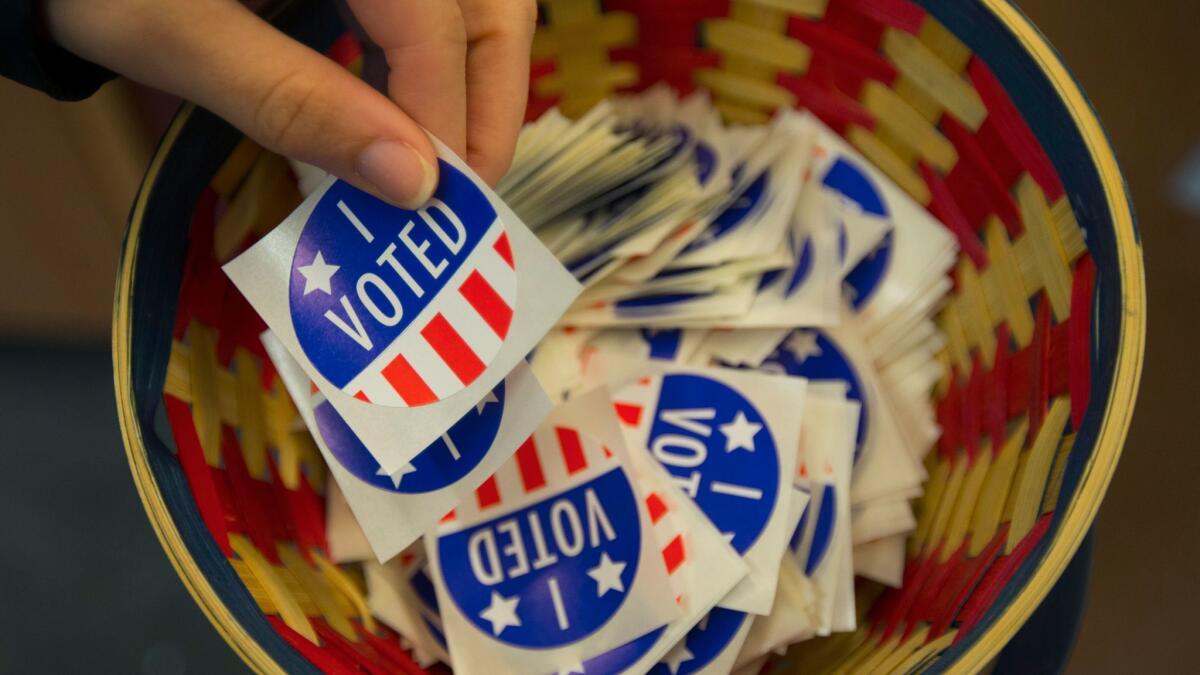Tired, torn, disgusted by this election? You still have to vote.

Disgusted with Hillary Clinton and Donald Trump? You’re in good company. At last count, the percentage of Americans who viewed Clinton favorably hung around 41%. Trump’s favorability rating was 38%.
The widespread distaste for Clinton and Trump is leading many people to decide not to vote this year. Here are a few of the dozens who have said it to me:
- A #NeverTrump Republican who hates Clinton, and can’t get there with her;
- A socialist who doesn’t believe that Clinton will represent the far-left coalition the Sen. Bernie Sanders animated;
- A member of the military who wishes to, on principle, abstain from casting a vote against a candidate who may yet become his commander in chief; and
- A feminist who believes that the Clintons’ policies on mass incarceration harmed black American irreparably, and who does not believe that Hillary’s contrition is authentic.
I have a great deal of respect for each of these people, and for their thought processes. They’ve educated themselves on the election; they care deeply about our country’s future; they are kind and intelligent and perceptive.
But no matter how much we may empathize with the impulse, the fact remains that the single most irresponsible thing you can do in this crucial election is to abstain from voting.
Any action shows more self-determination than sitting at home twiddling your thumbs during the most polarizing election since the mid-19th century.
You can patiently sift through your indifference or disgust and then vote for the major-party candidate whose values you find less threatening to life on Earth. You can fill in the circle for Gary Johnson or Jill Stein. You can write in Sanders or Edward Snowden or Glenn Beck, or Beyoncé. You can leave the presidential candidate column blank. Those aren’t all equal or productive choices, but any action shows more self-determination than sitting at home twiddling your thumbs during the most polarizing election since the mid-19th century. All of these options get you out of the house to vote on the races and initiatives further down the ballot.
The ballot in California is extensive; it has oodles of propositions and parcel taxes and local measures and judges up for voter review. The presidential race takes up one sheet; my ballot spanned six or seven sheets total. It took two newspaper endorsement guides, some handwritten notes and a couple of hours of study for me to navigate it. It was confusing. How the heck was I supposed to know whom to elect to our little city’s rent board? It was important. Thankfully, I had a device in my hand with all of the world’s information on it, as 72% of American adults do. I figured it out.
Lefty historian Howard Zinn famously wrote, “You can’t be neutral on a moving train”; it’s hard to imagine two trains moving faster away from each other than the ones Clinton and Trump are on. And as former Republican Treasury Secretary William E. Simon cautioned, “Bad politicians are sent to Washington by good people who don’t vote.”
But why is the decision to refrain from voting damning rather than merely disappointing, an act of moral cowardice rather than of conscientious abstention?
An oft-cited point: There are many people who pushed and fought and died for the right to cast a ballot, and many who are still pushing. I said this to the Sanders supporter mentioned earlier, and he laughed at my apparent naiveté. But this isn’t historical hyperbole. Americans are fighting to vote right now.
If you don’t feel connected to the thousands of women and allies who led the movement for the 19th Amendment and the thousands of black Americans and allies who fought tooth and nail to pass the 1965 Voting Rights Act — not to mention contemporary voter disenfranchisement, intimidation and suppression — consider that you are the likely beneficiary of significant racial, gender, socioeconomic or other forms of privilege. That’s an observation, not a condemnation.
Privilege is problematic to the extent that you let it insulate you from empathizing with those who aren’t like you. Deciding not to vote because you don’t connect to the deeply real anxieties of your countrymen and women, because you’ve decided that whatever way each and every one of these contests go, you’re going to be fine — that’s one way to live, but it’s not a particularly defensible one.
Americans are fighting to vote right now, and many face significant hurdles. For instance, many counties don’t have polling locations on or near reservations, which means that Native citizens have to travel long distances to vote in person, and they often don’t have the resources required to do. Why not vote absentee then? In the 2012 election, a number of Navajo were placed on “suspense lists” and their voter registrations were revoked. Because they lived far from paved highways on the reservation, some of their addresses were listed as “too obscure.” They weren’t assigned to precincts.
These issues are incredibly widespread; by March of this year, Native tribes had already noted voting-related problems in 17 states. Did these tribes decide not to vote? No, they chose to fight for their rights using litigation or tribal negotiation with local officials.
Meanwhile, hundreds of thousands of black Americans are showing up to vote in North Carolina, even though voter suppression efforts in the state have been well documented. Right now, local leaders with little socioeconomic and/or racial privilege are animating their communities to vote all across the country, using whatever resources are available to them.
For those who are privileged, voting is more than an option, it’s an obligation. Two different visions of the future are on the table in this election; one will be chosen. In choosing to sit it out, you would be making a statement that you find those visions equally palatable; that you are indifferent to each of the presidential candidates’ promises; that you’re unmoved by the socioeconomic strategies that will be employed in your communities; that you don’t care who’s elected to represent you in Congress or the Legislature; that the state and local measures that have been entrusted to the voters aren’t that big of a deal; that whatever happens, you will be fine, fine, fine.
And here’s a second statement you would be making: that whatever happens to everyone else — the vulnerable, the underrepresented, those who are not beneficiaries of such privilege that they can afford to tune out this entire embarrassing event — you’ll be fine with that too. If that’s a perspective you can’t defend, then get out there. Vote.
Melissa Batchelor Warnke is a contributing writer to Opinion. Follow her on Twitter @velvetmelvis.
More to Read
A cure for the common opinion
Get thought-provoking perspectives with our weekly newsletter.
You may occasionally receive promotional content from the Los Angeles Times.











